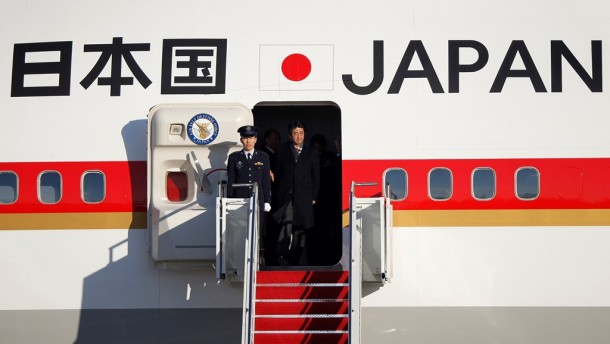TOKYO — Japanese Prime Minister Shinzo Abe will be seeking to put a strong US-Japan alliance on full display in the face of potential threats from a nuclear North Korea and an assertive China when he meets US President Barack Obama on Friday.
Abe, who has kept his ratings high since taking office in December, also needs Obama’s sign-off on his economic revival recipe of big spending and hyper-easy monetary policy.
Expectations for “Abenomics,” especially drastic monetary easing, have sliced about 10 percent off the yen’s value against the dollar since Abe took office, raising concern that Japan is weakening its currency to export its way out of recession.
“The situation in East Asia is becoming more and more precarious,” said Mikitaka Masuyama, a professor at Tokyo’s National Graduate Institute for Policy Studies. “One of the things he wants to achieve will be reinforcement of the Japan-US Alliance.”
“It would be a successful trip for Abe if his economic policy wins a nod from the US side or at least if it is not rejected outright,” he added.
Abe, due to arrive in Washington late on Thursday, also hopes to secure at least a wink and a nod from Obama that would allow him to argue that Japan can negotiate special treatment for politically sensitive sectors such as rice if it joins talks on a US-led free trade pact.
US Trade Representative Ron Kirk told Reuters in an interview on Wednesday that Tokyo must be open to negotiation on all trade sectors, but did not rule out the possibility of special treatment in the final deal.
Japan’s big businesses wants it to join the Trans-Pacific Partnership (TPP) pact to avoid being left behind in global competition, but powerful farm lobbies are opposed, dividing Abe’s ruling Liberal Democratic Party (LDP).
Previewing the meeting, Michael Froman, Obama’s adviser on international economics, said the two leaders would review the status of TPP consultations and insisted that Japan would be expected to put everything “on the table” for negotiation as other countries in the process have done.
Froman declined to say whether the president would raise Japan’s currency during the talks. But he told reporters: “The US and Japan have a shared interest in seeing stronger global growth in the economy and we agree that no countries should target currencies for competitive purpose or try to grow at the expense of others.”
Aides say Abe’s top priority for the visit, during which he will hold a summit on Friday with Obama and deliver a policy speech entitled “Japan is Back,” is to repair an alliance they argue was dented by the 2009-2012 rule of the Democratic Party of Japan (DPJ).
During the three years and three months of the Democratic Party government, there was a great gap in the US-Japan alliance,” said a close aide to Abe. “So the biggest objective is to rebuild the alliance.”
Outside experts agree the alliance suffered under the first DPJ prime minister, Yukio Hatoyama, who tried unsuccessfully to revise a deal to move a US Marine air base to a sparsely populated part of Japan’s Okinawa island.
But Abe’s immediate predecessor, Yoshihiko Noda, did much to repair the damage, they say.
The two leaders will spend time on the need for stronger sanctions on North Korea and are likely to discuss beefed up missile defense after Pyongyang’s latest nuclear test last week.
Ben Rhodes, Obama’s deputy national security adviser, said they would consult on North Korea’s “provocative acts” as part of Washington’s effort to reaffirm its commitment to Asian allies while sending a message to Pyongyang that it will be held responsible for its actions.
The hawkish Abe will also be hoping that putting a robust alliance on display sends a signal to China not to escalate the row over tiny islands in the East China Sea claimed by both Japan and China.
“It is important for us to have them recognize that it is impossible to try to get their way by coercion or intimidation. In that regard, the Japan-U.S. alliance, as well as the US presence, would be critical,” Abe told the Washington Post in an interview.
Tension has raised fears of an unintended military incident near the islands, known as the Senkaku in Japan and the Diaoyu in China. Washington says the islets fall under a US-Japan security pact, but it is keen to avoid a clash in such an economically vital region.
“No one wants to allow tensions … to escalate,” said Danny Russel, Obama’s Asia adviser.
The president “will value hearing the prime minister’s assessment and will welcome any and all constructive steps to engage diplomatically and to manage the maritime situation in a way that prevents the risk of miscalculation,” he said.
Obama and Abe may also discuss cyber-security, the White House said. US officials have become increasingly concerned amid growing reports of China’s role in cyber-attacks on US government and corporate entities—something Beijing denies.
Abe is expected to come bearing one welcome gift—a promise Japan will finally join an international treaty on cross-border child custody disputes, known as The Hague Convention.
Japan has been the only member of the Group of Eight advanced nations not to join the pact, despite pressure from the United States and other countries.

















